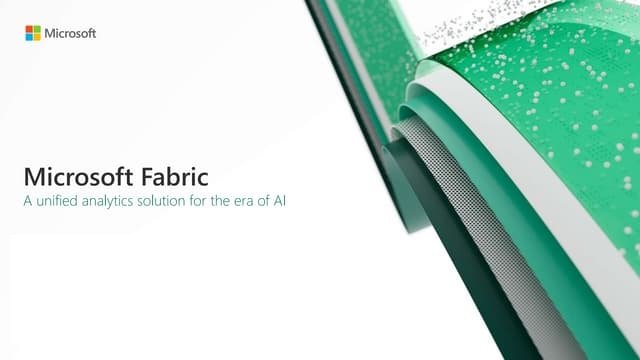In today’s data-driven world, enterprises are constantly struggling to manage their ever-growing data volumes. This can be a complex and time-consuming task, often requiring businesses to maintain copies of their data in multiple locations. This not only leads to data silos but also increases the cost and complexity of data management.
Microsoft is looking to change that with the recent addition of Iceberg support to its Azure Fabric service. This is a significant development that will simplify data management for enterprises by enabling them to store and access their data in a single location.
What is Iceberg?
Iceberg is an open-source data table format that is specifically designed for large-scale data warehouses. It provides a number of advantages over traditional data formats, including:
- Scalability: Iceberg can handle massive datasets efficiently.
- Reliability: Iceberg ensures data consistency and integrity.
- Efficiency: Iceberg optimizes data queries for faster performance.
What does Iceberg mean for enterprises?
The addition of Iceberg support to Microsoft Fabric means that enterprises can now:
- Store all their data in one place: This eliminates the need to maintain copies of data in multiple locations, reducing storage costs and simplifying data management.
- Improve data access: With Iceberg’s efficient query processing, users can access data faster and more easily.
- Reduce costs: By eliminating the need for data silos, enterprises can save money on data storage and management.
Real-life example: Streamlining data management for a retail company
Imagine a large retail company that collects data from a variety of sources, such as point-of-sale systems, customer loyalty programs, and social media. This data is essential for the company to understand its customers, optimize its marketing campaigns, and improve its overall operations.
In the past, the retail company would have had to store this data in multiple locations, making it difficult to access and analyze. With Microsoft Fabric’s Iceberg support, the company can now store all of its data in a single location. This will make it much easier for the company’s data analysts to access the data they need to generate insights that can help the company improve its bottom line.
Conclusion
The addition of Iceberg support to Microsoft Fabric is a game-changer for enterprises. It will simplify data management, improve data access, and reduce costs. This is a welcome development for businesses of all sizes that are struggling to keep up with the demands of today’s data-driven world.
Additionally, here are some key points to consider on Iceberg
- Microsoft Fabric’s support for Iceberg complements its existing support for other open data formats, such as Apache Parquet and Delta Lake. This gives enterprises greater flexibility in choosing the data format that best suits their needs.
- The partnership between Microsoft Fabric and Snowflake for bi-directional data access is another positive development that will further simplify data management for enterprises.
By embracing open data formats and partnering with other industry leaders, Microsoft is making it easier for enterprises to get the most out of their data.

Here are few frequently asked questions on Iceberg Azure support:
Does Azure support Iceberg?
Azure doesn’t directly support Iceberg itself, but there are ways to use Iceberg with Azure services. Here are two common approaches:
- Azure Databricks: Azure Databricks, a data analytics service on Azure, supports Apache Spark which can work with Iceberg tables. You can use Spark to read, write, and query data stored in Iceberg format on Azure Blob Storage.
- Third-party tools: Several third-party data integration tools can work with Iceberg on Azure. These tools can help you move data between Iceberg tables and other data sources in Azure.
What is the Iceberg format?
Iceberg is an open-source table format for data warehouses. It’s designed to efficiently manage large amounts of data and ensure data consistency. Here are some key benefits of Iceberg:
- ACID transactions: Iceberg guarantees ACID properties (Atomicity, Consistency, Isolation, Durability) for data operations.
- Schema evolution: Iceberg allows you to evolve your data schema over time without affecting existing queries.
- Partitioning and data skipping: Iceberg lets you partition your data and efficiently skip irrelevant data during queries.
While Azure doesn’t natively support Iceberg, it provides options to leverage its functionalities through Databricks and other tools.




Leave a Reply